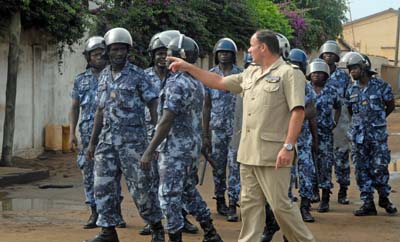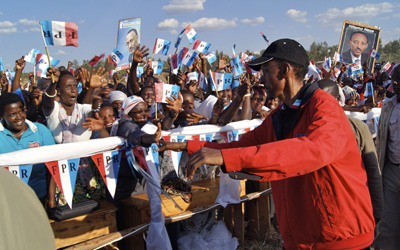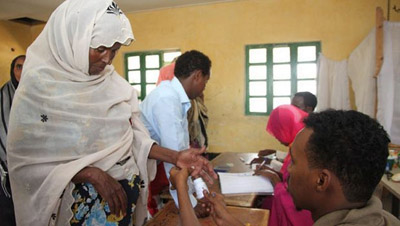
French officer proves ‘allergic’ to photos in Togo
It has been a week since Togolese photojournalist Komi Agbedivlo, better known as “Didier Ledoux,” was verbally abused by a military officer from France as he covered a political demonstration in the capital, Lome. The incident might have gone unnoticed, if not for social media and a year charged with historical symbolism for Togo, which is celebrating 50 years of independence from France. So the…
Pakistani TV stations remain off the air during floods
New York, August 10, 2010–Pakistan’s major news broadcasters ARY TV and GEO TV are off the air in Karachi and Sindh province for a third day since supporters of the Pakistan Peoples Party (PPP) of President Asif Ali Zardari have reportedly severed cable connections of the distributors that carry them. Demonstrations at the offices of the distributors and the…
Sudan bans BBC Arabic, tightens grip on the press
New York, August 9, 2010—The Sudanese government has announced it is suspending the BBC’s license to broadcast in Arabic on local FM frequencies in four northern cities, including the capital, Khartoum. Security personnel also informed editors in recent days that journalists who had not completed an extensive government questionnaire would be detained, journalists told CPJ.

In Rwanda election, no critical domestic press
“No one but you!” supporters of President Paul Kagame have shouted at recent election rallies with many waving the red, white, and blue flags that symbolize the ruling Rwandan Patriotic Front party, according to local and international reports. But journalists critical of the ruling party could not document firsthand the campaign that ended today because…
Decade into al-Assad’s rule, media suffering in Syria
Your Excellency: As you celebrate the 10th anniversary of your ascent to power this month, we are writing to draw your attention to conditions that continue to undermine press freedom in Syria. In 10 years, conditions for the media have hardly improved, with the government still deciding who is and isn’t a journalist, filtering the Internet, and imprisoning reporters for their critical work.
OSCE summit should address Kazakhstan press record
New York, July 19, 2010—The Committee to Protect Journalists calls on the Organization for Security and Co-operation in Europe (OSCE) to place Kazakhstan’s poor press freedom record on the agenda for its summit planned for later this year. Kazakhstan, the OSCE chair, is scheduled to host the summit in its capital, Astana.
Kyrgyz agents raid TV station, interrogate director
New York, July 13, 2010—The Committee to Protect Journalists condemns a Friday raid on the newsroom of the independent Uzbek-language broadcaster Osh TV in the southern Kyrgyz city of Osh. The Kyrgyz security service (known as SNB) also temporarily detained director Khalil Khudaiberdiyev in the raid on the station. Osh TV is currently off the air,…

An appeal from ailing Tunisian journalist Boukadous
You are all no doubt aware of what I went through this past week. Indeed, though I suffered an acute asthmatic attack that necessitated sending me to the Farhat Hached Teaching Hospital in Sousse from July 3, the Gafsa Court of Appeals insisted on sentencing me to a four-year prison term. It took no notice…
India must stop restricting journalists in Kashmir
New York, July 9, 2010—National authorities in India must immediately address complaints from local journalists in Indian-controlled Kashmir who say they are being stopped from covering the government crackdown on protests that have killed 15 people.

Somaliland elections and coverage surprisingly…normal
Critical voices in the East African media—whether in Ethiopia, Rwanda, Burundi, or Uganda—have been intimidated, banned, blocked, and beaten prior to elections in recent years. Somalia is so embroiled in conflict that even the concept of having elections remains a faraway dream. But in late June, the semi-autonomous region of Somaliland in northern Somalia managed to hold relatively peaceful and free elections with decent media…